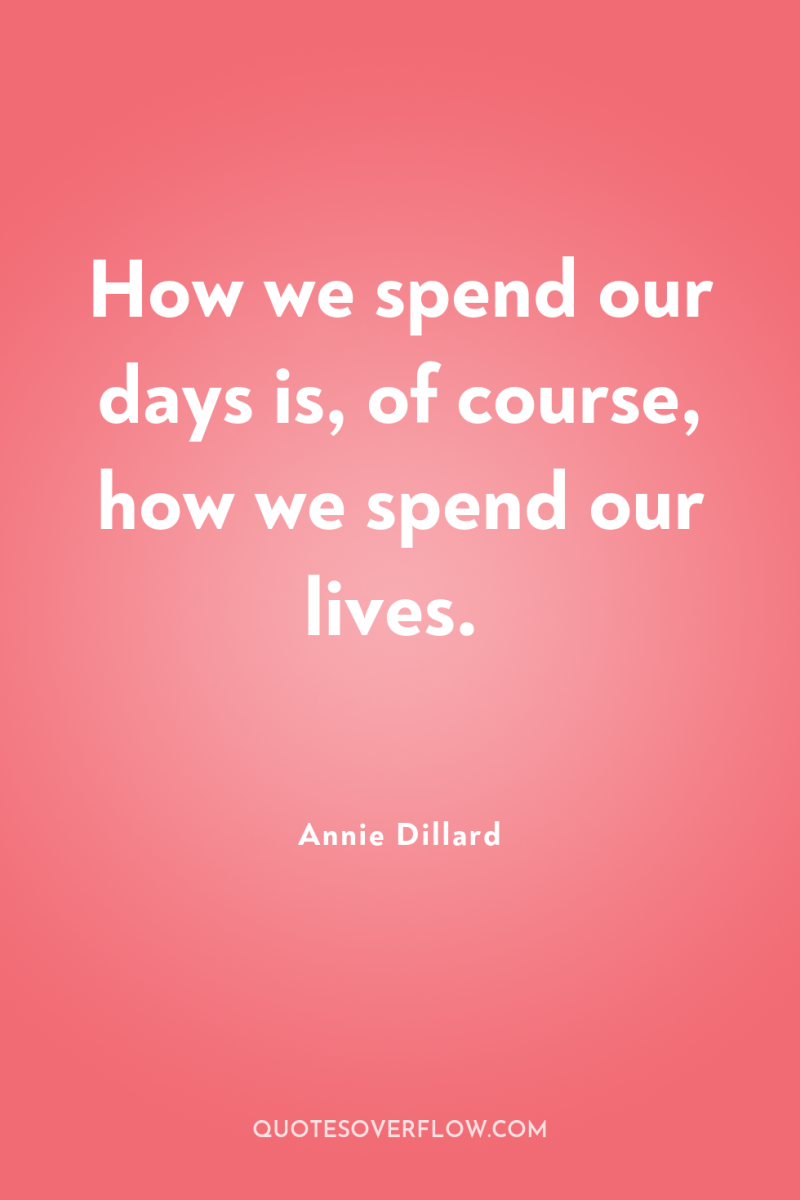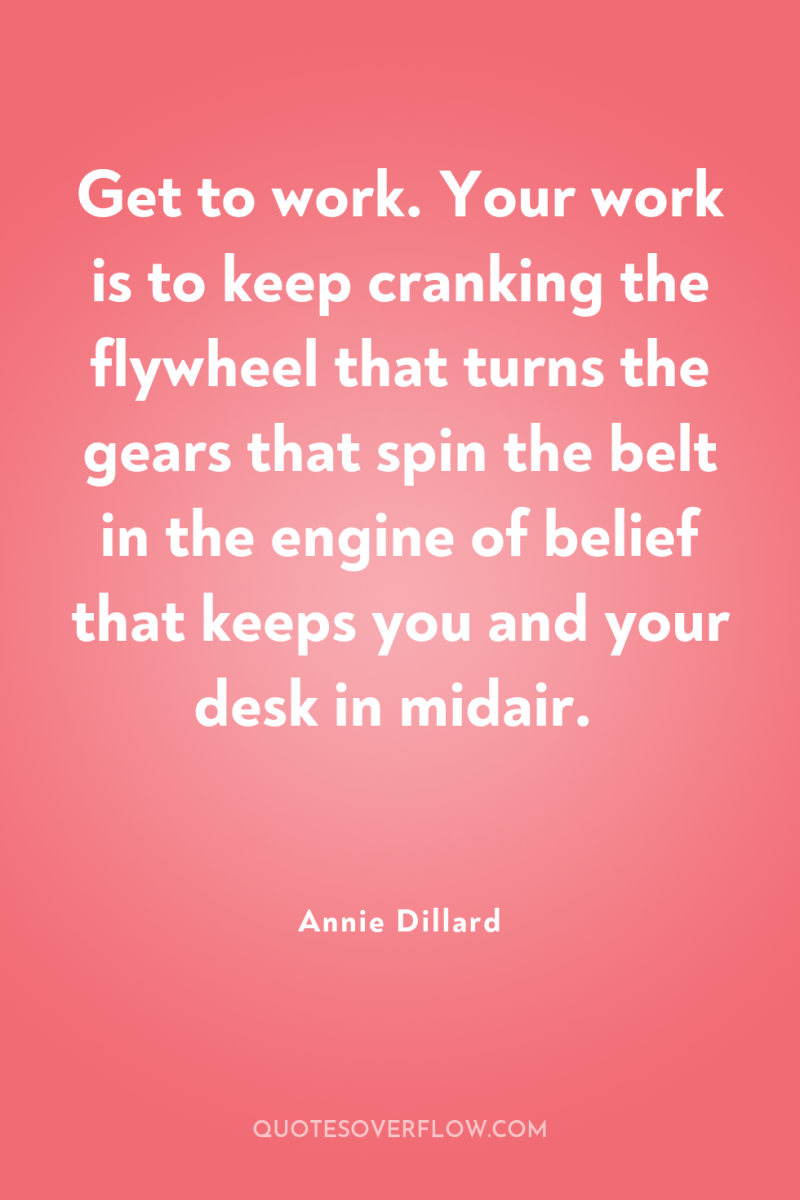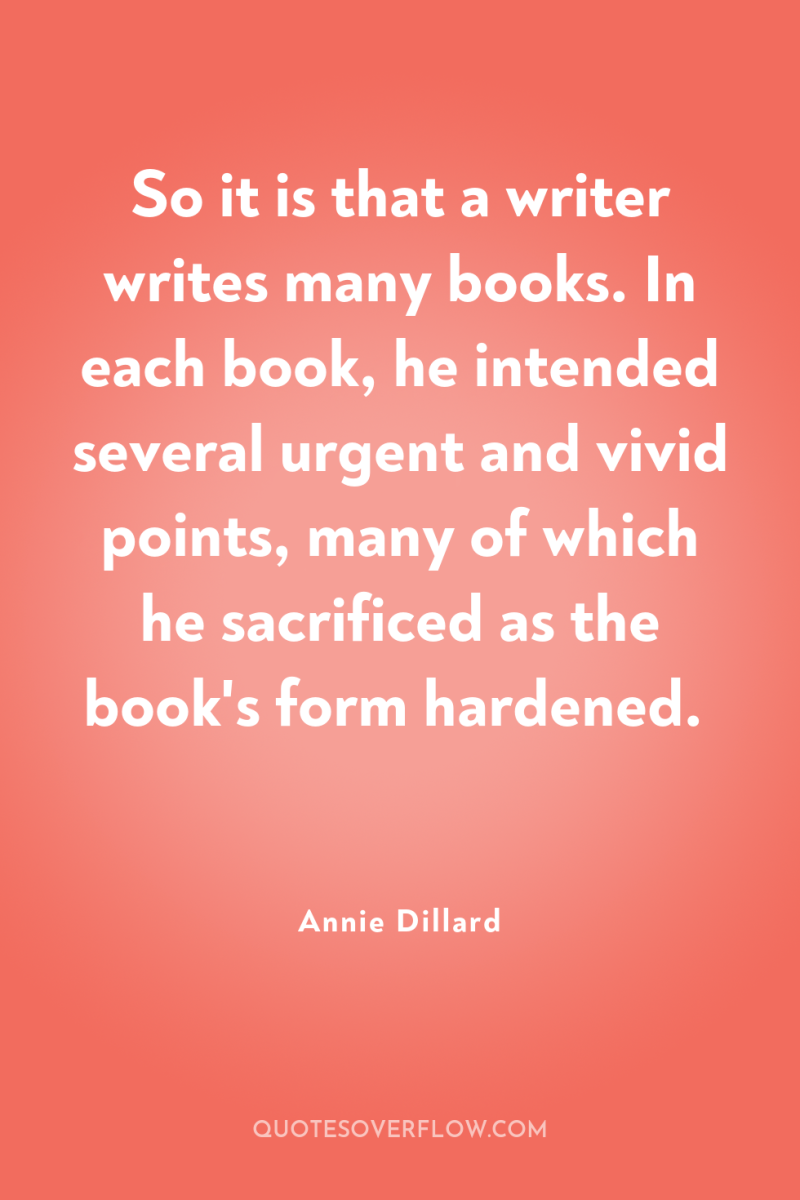
1
How we spend our days is, of course, how we spend our lives.Annie Dillard
2
If you ask a twenty-one-year-old poet whose poetry he likes, he might say, unblushing, "Nobody's, " In his youth, he has not yet understood that poets like poetry, and novelists like novels; he himself likes only the role, the thought of himself in a hat.Annie Dillard
3
Why are we reading, if not in hope of beauty laid bare, life heightened and its deepest mystery probed? Can the writer isolate and vivify all in experience that most deeply engages our intellects and our heats? Can the writer renew our hope for literary forms? Why are we reading if not in hope that the writer will magnify and dramatize our days, will illuminate and inspire us with wisdom, courage, and the possibility of meaningfulness, and will press upon our minds the deepest mysteries, so we may feel again their majesty and power? .Annie Dillard
4
There is neither a proportional relationship, nor an inverse one, between a writer’s estimation of a work in progress & its actual quality. The feeling that the work is magnificent, & the feeling that it is abominable, are both mosquitoes to be repelled, ignored, or killed, but not indulged.Annie Dillard

5
Get to work. Your work is to keep cranking the flywheel that turns the gears that spin the belt in the engine of belief that keeps you and your desk in midair.Annie Dillard

6
So it is that a writer writes many books. In each book, he intended several urgent and vivid points, many of which he sacrificed as the book's form hardened.Annie Dillard
7
How we spend our days is, of course, how we spend our lives. What we do with this hour and with that one, is what we are doing.Annie Dillard
8
How we spend our days is, of course, how we spend our lives. What we do with this hour, and that one, is what we are doing. A schedule defends from chaos and whim. It is a net for catching days. It is a scaffolding on which a worker can stand and labor with both hands at sections of time. A schedule is a mock-up of reason and order–willed, faked, and so brought into being; it is a peace and a haven set into the wreck of time; it is a lifeboat on which you find yourself, decades later, still living.Annie Dillard
9
One of the few things I know about writing is this:spend it all, shoot it, play it, lose it, right away, every time. Do not hoard what seems good for a later place in the book, or for another book; give it, give it all, give it now. The impulse to save something good for a better place later is a signal to spend it now. Something more will arise later, something better. These things fill from behind, from beneath, like well water.Annie Dillard
10
Only after a writer lets literature shape her can she perhaps shape literature. In working-class France, when an apprentice got hurt, or when he got tired, the experienced workers said, "It is the trade entering his body." The art must enter the body, too.Annie Dillard
11
Appealing workplaces are to be avoided. One wants a room with no view, so imagination can meet memory in the dark.Annie Dillard
12
I do not so much write a book as sit up with it, as with a dying friend. During visiting hours, I enter its room with dread and sympathy for its many disorders. I hold its hand and hope it will get better. This tender relationship can change in a twinkling. If you skip a visit or two, a work in progress will turn on you.Annie Dillard
13
The feeling that the work is magnificent, and the feeling that it is abominable, are both mosquitoes to be repelled, ignored, or killed, but not indulged.Annie Dillard
14
Young women are closer to the time when they were manipulative and childish and they don't let their babies manipulate them as much as older mothers do. These are only my conclusions from watching children in grocery stores. I love to watch them work on their mothers to get what they want, and, because I am always a child, I'm pulling for them to get the candy and to get it NOW. The other day I watched a little blond beauty pull her mother's face to her and lay her hands on her mother's cheeks and kiss her nose. Needless to say they opened the bag of cookies then and there.Ellen Gilchrist
15
The most demanding part of living a lifetime as an artist is the strict discipline of forcing oneself to work steadfastly along the nerve of one’s own most intimate sensitivity.Annie Dillard
16
Putting a book together is interesting and exhilarating. It is sufficiently difficult and complex and it engages all your intelligence. It is life at its most free. Your freedom as a writer is not freedom of expression in the sense of wild blurting; you may not let it rip. It is life at its most free, if you are fortunate enough to be able to try it, because you select your materials, invent your task, and pace yourself.Annie Dillard
17
Nobody whispers it in your ear. It is like something you memorized once and forgot. Now it comes back and rips away your breath. You find and finger a phrase at a time; you lay it down cautiously, as if with tongs, and wait suspended until the next one finds you: Ah yes, then this; and yes, praise be, then this.Annie Dillard
18
Now the thing is no longer a vision: it is paper.Annie Dillard
19
Write as if you were dying. At the same time, assume you write for an audience consisting solely of terminal patients. That is, after all, the case. What would you begin writing if you knew you would die soon? What could you say to a dying person that would not enrage by its triviality?Annie Dillard
20
Writing every book, the writer must solve two problems: Can it be done? and, Can I do it? Every book has an intrinsic impossibility, which its writer discovers as soon as his first excitement dwindles.Annie Dillard
21
We still and always want waking. We should amass half dressed in long lines like tribesmen and shake gourds at each other, to wake up; instead we watch television and miss the show.Annie Dillard
22
One of the things I know about writing is this: spend it all, shoot it, play it, lose it, all, right away, every time. Do not hoard what seems good for a later place in the book or for another book; give it, give it all, give it now. The impulse to save something good for a better place later is the signal to spend it now. Something more will arise for later, something better. These things fill from behind, from beneath, like well water. Similarly, the impulse to keep to yourself what you have learned is not only shameful, it is destructive. Anything you do not give freely and abundantly becomes lost to you. You open your safe and find ashes.Annie Dillard
23
In working-class France, when an apprentice got hurt, or when he got tired, the experienced workers said "It is the trade entering his body.Annie Dillard